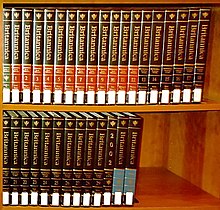
Back Naslaanwerk Afrikaans عمل مرجعي Arabic Белешмәлек Bashkir Даведнік Byelorussian Obra de referència Catalan کاری سەرچاوە CKB Справочник CV Nachschlagewerk German Referencverko Esperanto Obra de referencia Spanish



A reference work is a non-fiction work, such as a paper, book or periodical (or their electronic equivalents), to which one can refer for information.[1] The information is intended to be found quickly when needed. Such works are usually referred to for particular pieces of information, rather than read beginning to end. The writing style used in these works is informative; the authors avoid use of the first person, and emphasize facts.
Indices are a common navigation feature in many types of reference works. Many reference works are put together by a team of contributors whose work is coordinated by one or more editors, rather than by an individual author. Updated editions are usually published as needed, in some cases annually (Whitaker's Almanack, Who's Who).
Reference works include textbooks, almanacs, atlases, bibliographies, biographical sources, catalogs such as library catalogs and art catalogs, concordances, dictionaries, directories such as business directories and telephone directories, discographies, encyclopedias, filmographies, gazetteers, glossaries, handbooks, indices such as bibliographic indices and citation indices, manuals, research guides, thesauruses, and yearbooks.[2] Many reference works are available in electronic form and can be obtained as reference software, CD-ROMs, DVDs, or online through the Internet. Wikipedia, an online encyclopedia, is both the largest and the most-read reference work in history.[3]
- ^ "Reference". Merriam-Webster Dictionary. Retrieved 29 November 2019.
- ^ Reitz, Joan M. (10 January 2013). "Reference book". Online Dictionary for Library and Information Science. Retrieved 29 November 2019.
- ^ "Wikipedia is 20, and its reputation has never been higher". The Economist. 9 January 2021. Archived from the original on 31 December 2022. Retrieved 31 May 2021.
© MMXXIII Rich X Search. We shall prevail. All rights reserved. Rich X Search